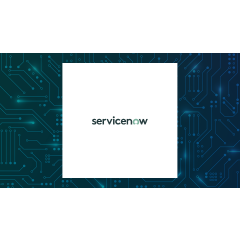There is no news article provided. Please share the article you'd like me to summarize, and I'll be happy to assist you.
Read full article
April 26, 2025 • By MarketBeat News
According to MarketBeat's stock screener tool, the top 7 healthcare stocks to watch are ServiceNow, Alphabet, UnitedHealth Group, Salesforce, Thermo Fisher Scientific, Merck & Co., and Vertiv. These companies have had the highest dollar trading volume in the healthcare sector over the last few days. ServiceNow provides workflow automation solutions and traded up $125.87 to $938.57 on Thursday. Alphabet offers various products and platforms, trading up $3.18 to $158.53. UnitedHealth Group operates as a diversified healthcare company, trading down $1.28 to $426.68. Salesforce provides Customer Relationship Management technology, trading up $12.74 to $263.22. Thermo Fisher Scientific offers life sciences solutions, trading down $9.96 to $421.68. Merck & Co. engages in the provision of health solutions, trading down $0.22 to $78.52. Vertiv designs and services critical digital infrastructure technologies, trading up $5.70 to $83.70. These companies have varying market capitalizations, price-to-earnings ratios, and debt-to-equity ratios. Investors can use this information to make informed decisions about their investments in the healthcare sector.

April 26, 2025 • By MarketBeat News
The article highlights five stocks to watch, including ServiceNow, Procter & Gamble, O'Reilly Automotive, Colgate-Palmolive, and Chevron. These companies had the highest dollar trading volume in the oil sector over the last few days. Here's a brief summary of each company's stock performance: 1. ServiceNow (NYSE: NOW) traded up $123.87 to $936.57, with 3,886,506 shares exchanged. 2. Procter & Gamble (PG) traded down $7.81 to $157.92, with 9,411,022 shares exchanged. 3. O'Reilly Automotive (NASDAQ: ORLY) traded down $36.73 to $1,343.77, with 607,410 shares exchanged, and announced a 15-1 stock split. 4. Colgate-Palmolive (CL) traded down $1.09 to $92.80, with 4,882,225 shares exchanged. 5. Chevron (NYSE: CVX) traded up $2.26 to $138.94, with 3,038,906 shares exchanged. These companies operate in various sectors, including technology, consumer goods, automotive, and energy. Their stock prices are influenced by factors such as supply and demand, geopolitical events, and regulatory changes.

April 26, 2025 • By MarketBeat News
According to MarketBeat's stock screener tool, the top 7 Artificial Intelligence (AI) stocks to watch are ServiceNow, Salesforce, Super Micro Computer, Accenture, Arista Networks, QUALCOMM, and Snowflake. These companies have the highest dollar trading volume in AI stocks over the last few days. They specialize in various AI-related fields, including workflow automation, customer relationship management, server and storage solutions, professional services, data-driven networking, wireless technology, and cloud-based data platforms. On Thursday, the stocks traded up, with ServiceNow reaching $934.82, Salesforce at $262.49, Super Micro Computer at $34.54, Accenture at $290.33, Arista Networks at $74.76, QUALCOMM at $146.41, and Snowflake at $154.84. The companies have market capitalizations ranging from $20.50 billion to $252.25 billion, with price-to-earnings ratios and betas varying across the board. Investors are drawn to these AI stocks for their growth potential in innovation across sectors like cloud computing, semiconductors, healthcare, and automotive. The companies' financials, including their 50-day and 200-day moving averages, debt-to-equity ratios, and current ratios, are also provided. Overall, these AI stocks are worth watching due to their significant trading volumes and potential for growth in the AI-driven innovation space.

April 26, 2025 • By MarketBeat News
Nextdoor and Cloudastructure are two small-cap computer and technology companies. To determine which is the better investment, we compared them based on institutional ownership, earnings, risk, dividends, valuation, analyst recommendations, and profitability. Nextdoor has stronger institutional ownership, with 35.7% of shares owned by institutional investors and 46.0% owned by insiders. The company has a consensus price target of $2.75, suggesting a potential upside of 83.95%. Nextdoor operates a neighborhood network that connects neighbors, businesses, and public services, while Cloudastructure provides cloud-based artificial intelligence video surveillance and Remote Guarding services. Cloudastructure has lower revenue but higher earnings than Nextdoor. Overall, Nextdoor beats Cloudastructure on 6 of the 10 factors compared, making it the more favorable investment.

April 26, 2025 • By Julian Horsey
Former Google CEO Eric Schmidt has made predictions about the future of artificial intelligence (AI), warning that its capabilities may outpace human control. Schmidt forecasts the rise of artificial general intelligence (AGI) within 3-5 years, which could bring significant benefits but also raises concerns about ethics, job displacement, and geopolitical tensions. Key takeaways include: * AI is transforming scientific research, particularly through robotic wet labs, accelerating breakthroughs in fields like biosciences and pharmaceuticals. * The integration of AI into workflows is expected to unlock unprecedented opportunities for growth and development. * AGI could emerge within 3-5 years, driven by advancements in recursive self-improvement, and could possess human-like expertise across multiple domains. * The debate between open source and proprietary AI models is shaping the future of the technology, with concerns about intellectual property, exclusivity, and collaboration. * The global race for AI dominance is intensifying, with nations competing for leadership in AI development, and raising concerns about intellectual property theft, adversarial attacks, and military applications. Schmidt highlights the need for proactive measures to ensure responsible AI development, including international cooperation, regulatory frameworks, and a commitment to ethical principles. He also envisions a future where AI-powered agentic systems automate complex workflows, but raises critical questions about decision-making, accountability, and transparency.

April 26, 2025 • By MarketBeat News
ServiceNow's share price rose 1.1% after Royal Bank of Canada increased its price target from $975 to $1,060, with an outperform rating. The stock traded as high as $960 and last traded at $949.10, with 900,696 shares traded. Several other research reports have been released, with target prices ranging from $1,025 to $1,300. The stock has a consensus rating of "Moderate Buy" and an average price target of $1,032.94. Institutional investors own 87.18% of the company's stock, with recent purchases made by GAMMA Investing LLC, Norges Bank, and others. ServiceNow announced a share repurchase program authorizing $3 billion in share repurchases, indicating management believes the stock is undervalued.

April 26, 2025 • By MarketBeat News
Viasat, Inc. (NASDAQ:VSAT) has received an average "Hold" recommendation from 8 analysts, with 5 rating it as "Hold" and 3 as "Buy". The average 12-month target price is $14.57. Several research analyst reports have been released, with ratings ranging from "Market Perform" to "Buy". Institutional investors have made changes to their positions in the company, with some increasing their stakes. The company has a market cap of $1.17 billion and a debt-to-equity ratio of 1.35. Viasat provides broadband and communications products and services worldwide, including satellite-based fixed broadband services and mobile broadband services. The company reported a negative net margin of 9.49% and a negative return on equity of 8.37% in its last quarterly earnings results. Analysts anticipate that Viasat will post -0.54 earnings per share for the current fiscal year.

April 26, 2025 • By MarketBeat News
ServiceNow (NYSE:NOW) shares rose after Royal Bank of Canada increased its price target from $975 to $1,060. The stock opened at $900.31, up from its previous close of $812.70. Several analysts have set price targets, with a consensus target of $1,032.94 and an average rating of "Moderate Buy". Institutional investors own 87.18% of the company's stock, which has a market capitalization of $195.84 billion. ServiceNow reported quarterly earnings of $3.67 per share, meeting analysts' estimates, and announced a $3 billion share repurchase program.

April 26, 2025 • By Mark O'Connell
Jaron Lanier, a technologist and writer, recently expressed concern about the growing trend in Silicon Valley of prioritizing the development of superhuman artificial intelligence (AI) over human well-being. He recounted a conversation with young AI scientists who believed having human babies was "unethical" and that their focus should be on committing to the AI of the future. This ideology, known as "effective accelerationism," advocates for the rapid advancement of machine learning technology to hasten the advent of AI superintelligence, which could potentially solve all human problems or overthrow humanity. Lanier's comments highlight the anti-human tendencies within Silicon Valley's culture, which are also reflected in the ideas of philosopher Nick Land and entrepreneur Elon Musk, who has stated that humanity is a "biological bootloader" for digital superintelligence. This mindset is troubling, as it holds humanity in contempt and prioritizes the development of AI over human life.
April 26, 2025 • By hidera
The article discusses the limitations of guest users on AudioZ, specifically that they cannot leave comments on posts. It implies that to fully utilize the platform, including downloading content, users may need to register or log in.

April 26, 2025 • By Tom
Mike Krieger, co-founder of Instagram and current Chief Product Officer at Anthropic, shares his insights on entrepreneurship, product development, and technological advancement. He emphasizes the importance of understanding user needs, validating solutions, and forming strong teams. Krieger also highlights the significance of knowing when to pivot or persevere, and the value of nurturing early interests and remaining open to new opportunities. He notes that products should solve real problems, and that innovators should position their products to ride the wave of emerging capabilities. Krieger's experience with Instagram and Anthropic has taught him the importance of balancing cutting-edge technology with user-friendly design, and the need for transparency about AI capabilities and limitations. He advises young entrepreneurs to embrace non-linear career trajectories, focus on continuous learning and relationship-building, and be prepared for future challenges and opportunities.

April 26, 2025 • By Rich Ord
A recent breakthrough in AI research, known as "distillation," has enabled the creation of smaller, faster, and more capable language models. This technique, introduced by Geoffrey Hinton in 2015, involves training a smaller "student" model to mimic the abilities of a larger "teacher" model. The process, also known as knowledge distillation, allows for the transfer of knowledge from a complex model to a simpler one, resulting in smaller models that require less memory and computation, faster inference speeds, and performance that closely approaches the teacher's. A Chinese company, DeepSeek, recently demonstrated the power of distillation by releasing an open-source model called DeepSeek-V2, which achieved near-parity with OpenAI's flagship GPT-4 on several benchmarks. This breakthrough has significant implications for the AI arms race, as it shows that the capabilities of large language models can be replicated in smaller, more accessible models. DeepSeek's use of distillation allowed them to synthesize the strengths of several world-class models, outperforming individual models on specific tasks. The company's open-source approach has also challenged the traditional paradigm of proprietary AI models, where companies like OpenAI have maintained a competitive edge by keeping their models closed-source. The success of DeepSeek-V2 has sparked concerns about the potential risks of openly cloning proprietary AI models, but it also highlights the potential of distillation as a force multiplier for AI research, enabling the creation of more accessible and innovative models. As the AI landscape continues to evolve, the focus is shifting from who has the biggest model to who can innovate the fastest in algorithm, architecture, and openness.
April 26, 2025
The article discusses the evolution of influencer marketing over the last decade, from its beginnings as a niche social media trend to a established digital strategy generating billions in revenue. It started with celebrity endorsements, but with the rise of social media platforms like Instagram, YouTube, and TikTok, everyday people with niche expertise and passion became influencers. Today, influencer marketing is data-fueled, content-driven, and diverse, with a focus on authenticity and transparency. The future of influencer marketing will involve virtual influencers, AI and automation, stricter regulations, and integration with e-commerce. Brands will work with long-term partners who align with their values, and influencers will become brand ambassadors, co-creators, or partners in product development. The article concludes that influencer marketing will continue to evolve, with a focus on real connection, ethical practice, and innovative tooling, and that brands that adapt to these changes will prosper in the digital landscape.

April 25, 2025
The Simons Collaboration on Ecological Neuroscience (SCENE) is a 10-year program that aims to uncover how the brain integrates sensory and motor information to shape representations in the mind. The program will support six teams of researchers with over $8M per year to study 'sensorimotor' interactions in species ranging from rodents to humans. SCENE builds on principles from ecological psychology, which posits that the brain encodes affordances, or opportunities for action in an environment. The collaboration will bring together leading scientists in neuroscience and machine learning to discover how the brain represents these interactions and to identify fundamental principles of cognition applicable across species. The program is part of the Simons Neuroscience Collaborations, which are designed to support large-scale longitudinal studies and address fundamental questions about brain function.

April 25, 2025 • By Ryan Gibson
The increasing reliance on cloud applications has led to growing risks of data loss, breaches, and noncompliance. As worldwide end-user spending on public cloud services is forecast to grow 20.4% in 2024, reaching $679 billion, protecting cloud application data has become a mission-critical priority for enterprise executives. A robust strategy for protecting data in cloud applications involves several pillars, including data visibility, effective Identity and Access Management (IAM), encryption, automation, backup, and awareness. Enterprises need dynamic inventories to identify what data is stored, processed, or moved in the cloud, and who can access it. Modern Data Loss Prevention (DLP) solutions and Cloud Access Security Broker (CASB) platforms provide classification and continuous monitoring. Effective IAM restricts data access to users and applications that require it, following least privilege and zero-trust principles. Encryption at rest, in transit, and in use is also crucial. Additionally, infrastructure-as-code and policy-as-code standardize and automate secure configuration of cloud resources, eliminating human error and ensuring compliance. Continuous security posture monitoring enables real-time detection and remediation of drift from secure baselines. Developing and regularly testing a granular backup and disaster recovery strategy for all cloud applications is also essential. Investing in comprehensive, future-proofed data protection strategies is critical to the future of enterprise competitiveness and compliance. This requires a multi-layered approach spanning visibility, access control, encryption, automation, backup, and awareness, all underpinned by the right culture and continuous executive engagement.

April 25, 2025 • By Chris Hauk
Apple has removed its secret robotics division from under the oversight of John Giannandrea, the company's artificial intelligence chief. The division will now be headed by John Ternus, a senior vice president who oversees the hardware division. This move follows a similar change made earlier, where Siri development was taken away from Giannandrea and given to Mike Rockwell. Giannandrea will continue to lead Apple's AI and machine learning teams, but with a reduced number of engineers under his management. The change is seen as a sign that Apple leadership lacks confidence in Giannandrea's ability to head multiple teams, and is part of the company's efforts to prioritize Apple Intelligence development and catch up with other AI players like OpenAI and Google. The robotics team, now under Ternus, is working on several projects, including a tabletop robot with an arm that can move around an iPad-style display.

April 25, 2025 • By Jack Hodgkin
Artificial Intelligence (AI) is revolutionizing the Software-as-a-Service (SaaS) market, particularly in the Small and Medium-sized Business (SMB) sector. With $1.3 trillion in global SMB technology spending at stake, AI is vital for sales executives and SaaS leadership to unlock growth, efficiency, and scalability. AI addresses traditional challenges in selling to SMBs, such as resource-strapped buyers and high churn, by transforming the buyer journey. AI-powered tools analyze massive datasets to identify SMBs signaling intent to purchase, and natural language processing (NLP) provides actionable insights. This results in a 50% increase in lead-to-customer conversion rates and enables true personalization at scale, leading to lower customer acquisition costs and higher response rates. AI also raises the bar in demo and discovery phases, simplifies negotiation and proposal generation, and transforms sales enablement. However, it demands a new mindset in go-to-market strategy and customer relationship management. To capitalize on the AI revolution, leadership should focus on strategic deployment, ethical use of customer data, and transparency in decision-making. By embracing AI thoughtfully and ethically, sales leaders can outpace their peers in growth, efficiency, and market share. As the CEO of Microsoft, Satya Nadella, remarked, "Every company will become an AI company," and for enterprise SaaS sales to SMBs, this future is already here. Those who adapt fastest will define the next generation of winners.